Report on Leadership and Management Theories in Service Industries
VerifiedAdded on 2023/01/11
|15
|4496
|35
Report
AI Summary
This report provides an in-depth analysis of leadership and management practices within the service industry, using the Park Tower Knightsbridge hotel as a case study. It begins by examining classical management theories such as Weber's theory of bureaucracy, Taylor's scientific management, and administrative theory, assessing their application in the service context. The report delves into the roles of leaders, exploring different leadership styles including autocratic, democratic, and situational approaches. It then describes the management and leadership styles adopted by organizations, focusing on both leadership and management styles such as democratic and autocratic leadership and participative and consultative management styles, respectively, and compares the functions and roles of managers and leaders. The report also addresses internal and external factors influencing management styles and discusses motivational management approaches, including Hertzberg's Two Factor Theory. Finally, it offers insights into current and future management and leadership skills required by the service sector, comparing management and leadership styles across various service industries.
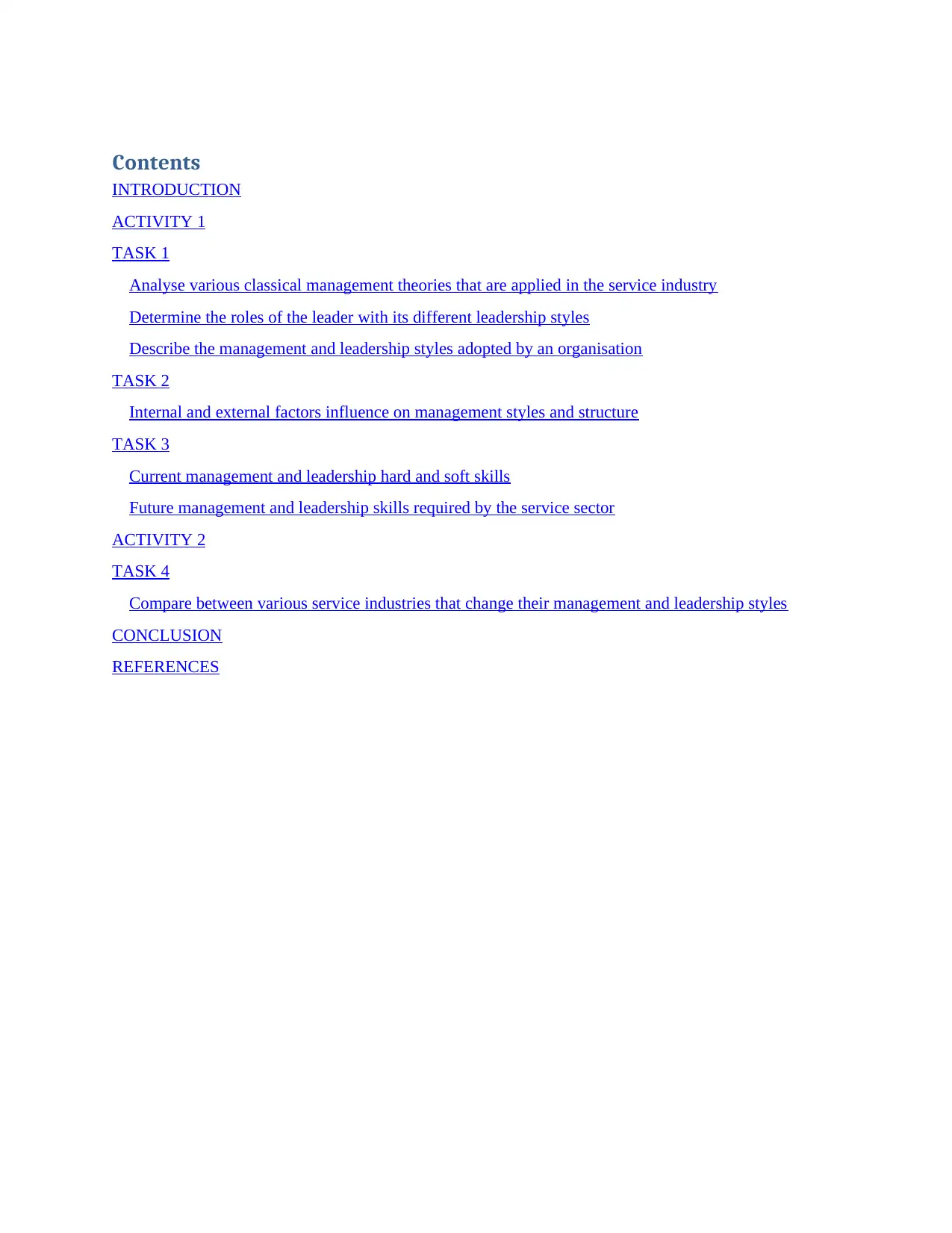
Contents
INTRODUCTION
ACTIVITY 1
TASK 1
Analyse various classical management theories that are applied in the service industry
Determine the roles of the leader with its different leadership styles
Describe the management and leadership styles adopted by an organisation
TASK 2
Internal and external factors influence on management styles and structure
TASK 3
Current management and leadership hard and soft skills
Future management and leadership skills required by the service sector
ACTIVITY 2
TASK 4
Compare between various service industries that change their management and leadership styles
CONCLUSION
REFERENCES
INTRODUCTION
ACTIVITY 1
TASK 1
Analyse various classical management theories that are applied in the service industry
Determine the roles of the leader with its different leadership styles
Describe the management and leadership styles adopted by an organisation
TASK 2
Internal and external factors influence on management styles and structure
TASK 3
Current management and leadership hard and soft skills
Future management and leadership skills required by the service sector
ACTIVITY 2
TASK 4
Compare between various service industries that change their management and leadership styles
CONCLUSION
REFERENCES
Paraphrase This Document
Need a fresh take? Get an instant paraphrase of this document with our AI Paraphraser
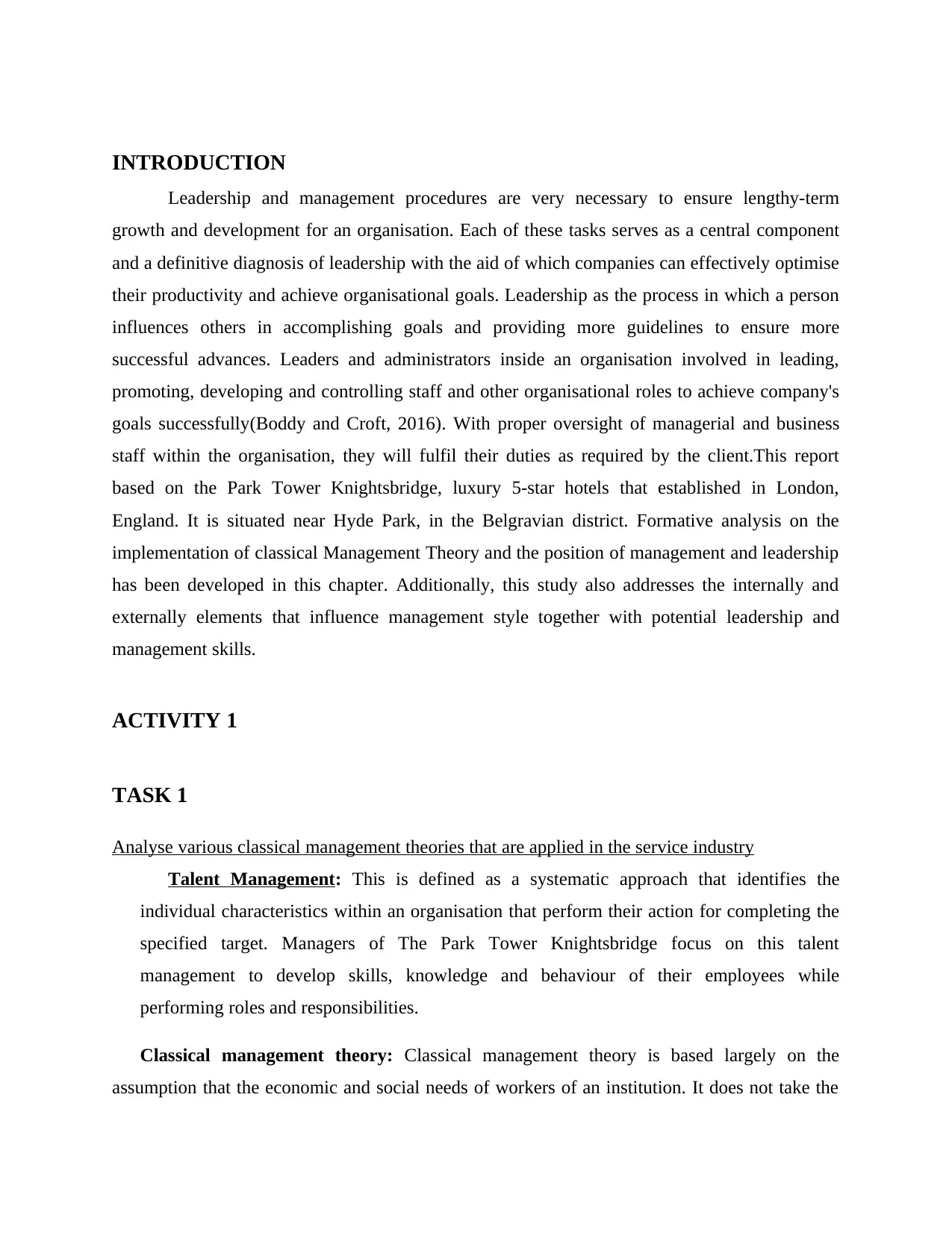
INTRODUCTION
Leadership and management procedures are very necessary to ensure lengthy-term
growth and development for an organisation. Each of these tasks serves as a central component
and a definitive diagnosis of leadership with the aid of which companies can effectively optimise
their productivity and achieve organisational goals. Leadership as the process in which a person
influences others in accomplishing goals and providing more guidelines to ensure more
successful advances. Leaders and administrators inside an organisation involved in leading,
promoting, developing and controlling staff and other organisational roles to achieve company's
goals successfully(Boddy and Croft, 2016). With proper oversight of managerial and business
staff within the organisation, they will fulfil their duties as required by the client.This report
based on the Park Tower Knightsbridge, luxury 5-star hotels that established in London,
England. It is situated near Hyde Park, in the Belgravian district. Formative analysis on the
implementation of classical Management Theory and the position of management and leadership
has been developed in this chapter. Additionally, this study also addresses the internally and
externally elements that influence management style together with potential leadership and
management skills.
ACTIVITY 1
TASK 1
Analyse various classical management theories that are applied in the service industry
Talent Management: This is defined as a systematic approach that identifies the
individual characteristics within an organisation that perform their action for completing the
specified target. Managers of The Park Tower Knightsbridge focus on this talent
management to develop skills, knowledge and behaviour of their employees while
performing roles and responsibilities.
Classical management theory: Classical management theory is based largely on the
assumption that the economic and social needs of workers of an institution. It does not take the
Leadership and management procedures are very necessary to ensure lengthy-term
growth and development for an organisation. Each of these tasks serves as a central component
and a definitive diagnosis of leadership with the aid of which companies can effectively optimise
their productivity and achieve organisational goals. Leadership as the process in which a person
influences others in accomplishing goals and providing more guidelines to ensure more
successful advances. Leaders and administrators inside an organisation involved in leading,
promoting, developing and controlling staff and other organisational roles to achieve company's
goals successfully(Boddy and Croft, 2016). With proper oversight of managerial and business
staff within the organisation, they will fulfil their duties as required by the client.This report
based on the Park Tower Knightsbridge, luxury 5-star hotels that established in London,
England. It is situated near Hyde Park, in the Belgravian district. Formative analysis on the
implementation of classical Management Theory and the position of management and leadership
has been developed in this chapter. Additionally, this study also addresses the internally and
externally elements that influence management style together with potential leadership and
management skills.
ACTIVITY 1
TASK 1
Analyse various classical management theories that are applied in the service industry
Talent Management: This is defined as a systematic approach that identifies the
individual characteristics within an organisation that perform their action for completing the
specified target. Managers of The Park Tower Knightsbridge focus on this talent
management to develop skills, knowledge and behaviour of their employees while
performing roles and responsibilities.
Classical management theory: Classical management theory is based largely on the
assumption that the economic and social needs of workers of an institution. It does not take the
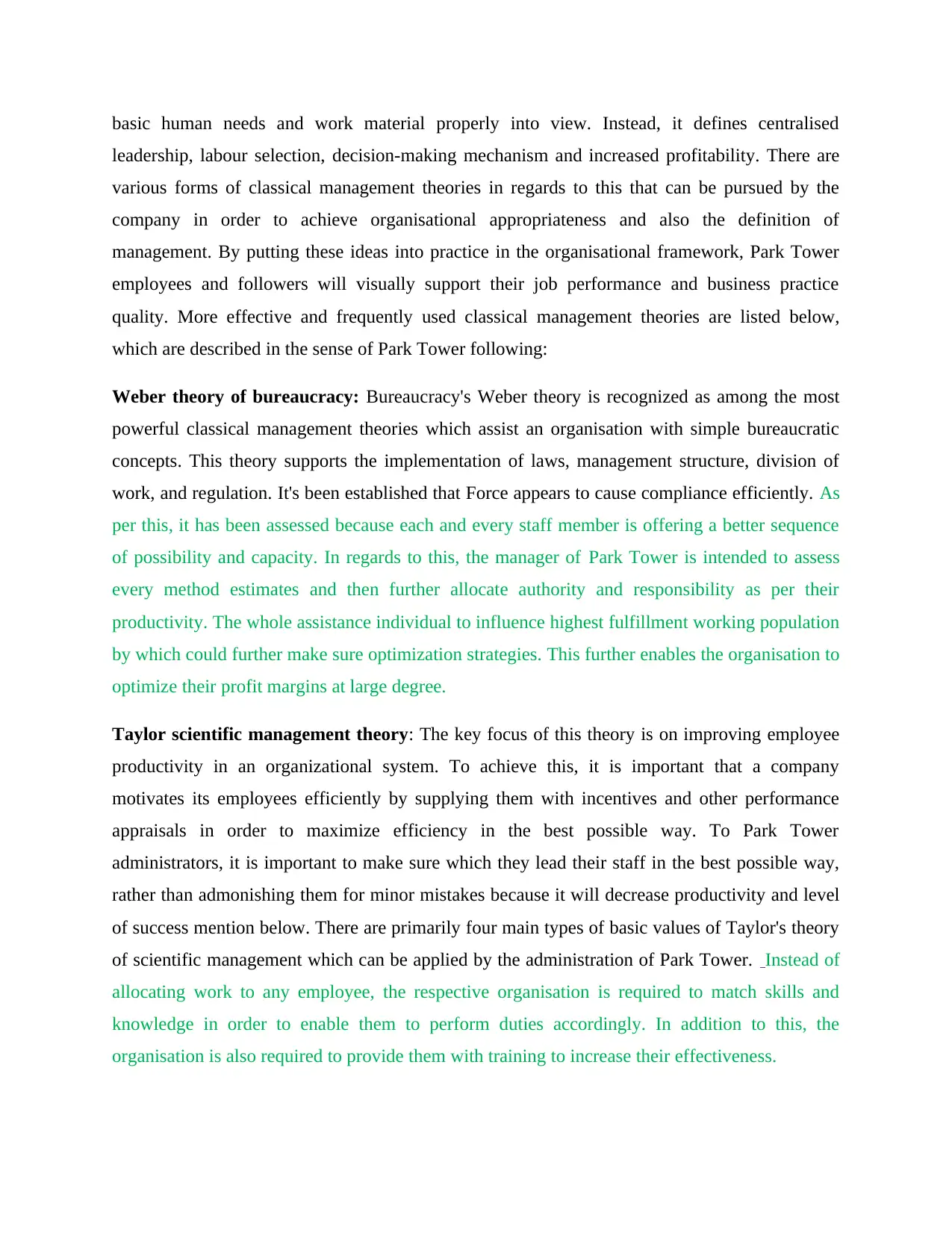
basic human needs and work material properly into view. Instead, it defines centralised
leadership, labour selection, decision-making mechanism and increased profitability. There are
various forms of classical management theories in regards to this that can be pursued by the
company in order to achieve organisational appropriateness and also the definition of
management. By putting these ideas into practice in the organisational framework, Park Tower
employees and followers will visually support their job performance and business practice
quality. More effective and frequently used classical management theories are listed below,
which are described in the sense of Park Tower following:
Weber theory of bureaucracy: Bureaucracy's Weber theory is recognized as among the most
powerful classical management theories which assist an organisation with simple bureaucratic
concepts. This theory supports the implementation of laws, management structure, division of
work, and regulation. It's been established that Force appears to cause compliance efficiently. As
per this, it has been assessed because each and every staff member is offering a better sequence
of possibility and capacity. In regards to this, the manager of Park Tower is intended to assess
every method estimates and then further allocate authority and responsibility as per their
productivity. The whole assistance individual to influence highest fulfillment working population
by which could further make sure optimization strategies. This further enables the organisation to
optimize their profit margins at large degree.
Taylor scientific management theory: The key focus of this theory is on improving employee
productivity in an organizational system. To achieve this, it is important that a company
motivates its employees efficiently by supplying them with incentives and other performance
appraisals in order to maximize efficiency in the best possible way. To Park Tower
administrators, it is important to make sure which they lead their staff in the best possible way,
rather than admonishing them for minor mistakes because it will decrease productivity and level
of success mention below. There are primarily four main types of basic values of Taylor's theory
of scientific management which can be applied by the administration of Park Tower. Instead of
allocating work to any employee, the respective organisation is required to match skills and
knowledge in order to enable them to perform duties accordingly. In addition to this, the
organisation is also required to provide them with training to increase their effectiveness.
leadership, labour selection, decision-making mechanism and increased profitability. There are
various forms of classical management theories in regards to this that can be pursued by the
company in order to achieve organisational appropriateness and also the definition of
management. By putting these ideas into practice in the organisational framework, Park Tower
employees and followers will visually support their job performance and business practice
quality. More effective and frequently used classical management theories are listed below,
which are described in the sense of Park Tower following:
Weber theory of bureaucracy: Bureaucracy's Weber theory is recognized as among the most
powerful classical management theories which assist an organisation with simple bureaucratic
concepts. This theory supports the implementation of laws, management structure, division of
work, and regulation. It's been established that Force appears to cause compliance efficiently. As
per this, it has been assessed because each and every staff member is offering a better sequence
of possibility and capacity. In regards to this, the manager of Park Tower is intended to assess
every method estimates and then further allocate authority and responsibility as per their
productivity. The whole assistance individual to influence highest fulfillment working population
by which could further make sure optimization strategies. This further enables the organisation to
optimize their profit margins at large degree.
Taylor scientific management theory: The key focus of this theory is on improving employee
productivity in an organizational system. To achieve this, it is important that a company
motivates its employees efficiently by supplying them with incentives and other performance
appraisals in order to maximize efficiency in the best possible way. To Park Tower
administrators, it is important to make sure which they lead their staff in the best possible way,
rather than admonishing them for minor mistakes because it will decrease productivity and level
of success mention below. There are primarily four main types of basic values of Taylor's theory
of scientific management which can be applied by the administration of Park Tower. Instead of
allocating work to any employee, the respective organisation is required to match skills and
knowledge in order to enable them to perform duties accordingly. In addition to this, the
organisation is also required to provide them with training to increase their effectiveness.
⊘ This is a preview!⊘
Do you want full access?
Subscribe today to unlock all pages.

Trusted by 1+ million students worldwide
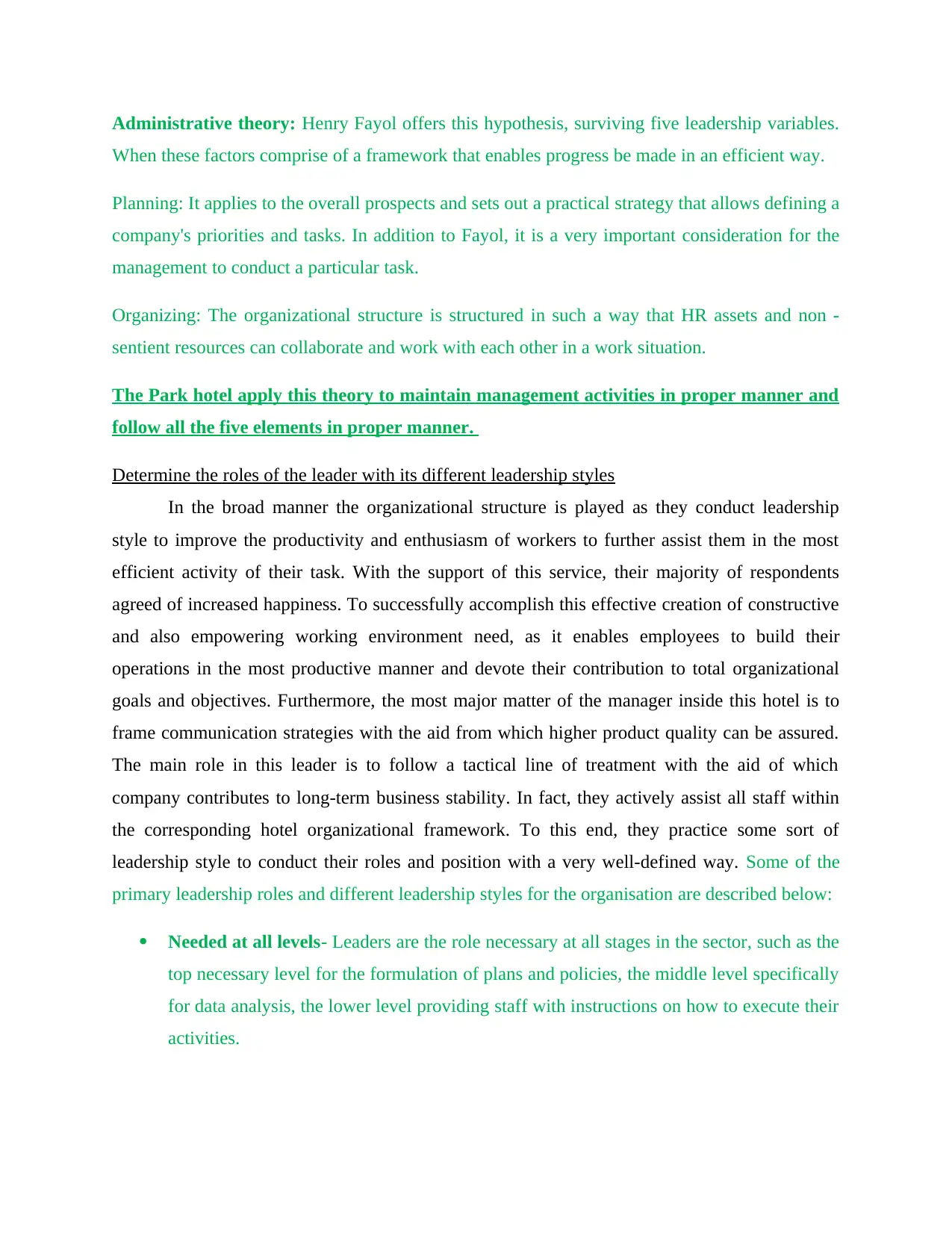
Administrative theory: Henry Fayol offers this hypothesis, surviving five leadership variables.
When these factors comprise of a framework that enables progress be made in an efficient way.
Planning: It applies to the overall prospects and sets out a practical strategy that allows defining a
company's priorities and tasks. In addition to Fayol, it is a very important consideration for the
management to conduct a particular task.
Organizing: The organizational structure is structured in such a way that HR assets and non -
sentient resources can collaborate and work with each other in a work situation.
The Park hotel apply this theory to maintain management activities in proper manner and
follow all the five elements in proper manner.
Determine the roles of the leader with its different leadership styles
In the broad manner the organizational structure is played as they conduct leadership
style to improve the productivity and enthusiasm of workers to further assist them in the most
efficient activity of their task. With the support of this service, their majority of respondents
agreed of increased happiness. To successfully accomplish this effective creation of constructive
and also empowering working environment need, as it enables employees to build their
operations in the most productive manner and devote their contribution to total organizational
goals and objectives. Furthermore, the most major matter of the manager inside this hotel is to
frame communication strategies with the aid from which higher product quality can be assured.
The main role in this leader is to follow a tactical line of treatment with the aid of which
company contributes to long-term business stability. In fact, they actively assist all staff within
the corresponding hotel organizational framework. To this end, they practice some sort of
leadership style to conduct their roles and position with a very well-defined way. Some of the
primary leadership roles and different leadership styles for the organisation are described below:
Needed at all levels- Leaders are the role necessary at all stages in the sector, such as the
top necessary level for the formulation of plans and policies, the middle level specifically
for data analysis, the lower level providing staff with instructions on how to execute their
activities.
When these factors comprise of a framework that enables progress be made in an efficient way.
Planning: It applies to the overall prospects and sets out a practical strategy that allows defining a
company's priorities and tasks. In addition to Fayol, it is a very important consideration for the
management to conduct a particular task.
Organizing: The organizational structure is structured in such a way that HR assets and non -
sentient resources can collaborate and work with each other in a work situation.
The Park hotel apply this theory to maintain management activities in proper manner and
follow all the five elements in proper manner.
Determine the roles of the leader with its different leadership styles
In the broad manner the organizational structure is played as they conduct leadership
style to improve the productivity and enthusiasm of workers to further assist them in the most
efficient activity of their task. With the support of this service, their majority of respondents
agreed of increased happiness. To successfully accomplish this effective creation of constructive
and also empowering working environment need, as it enables employees to build their
operations in the most productive manner and devote their contribution to total organizational
goals and objectives. Furthermore, the most major matter of the manager inside this hotel is to
frame communication strategies with the aid from which higher product quality can be assured.
The main role in this leader is to follow a tactical line of treatment with the aid of which
company contributes to long-term business stability. In fact, they actively assist all staff within
the corresponding hotel organizational framework. To this end, they practice some sort of
leadership style to conduct their roles and position with a very well-defined way. Some of the
primary leadership roles and different leadership styles for the organisation are described below:
Needed at all levels- Leaders are the role necessary at all stages in the sector, such as the
top necessary level for the formulation of plans and policies, the middle level specifically
for data analysis, the lower level providing staff with instructions on how to execute their
activities.
Paraphrase This Document
Need a fresh take? Get an instant paraphrase of this document with our AI Paraphraser
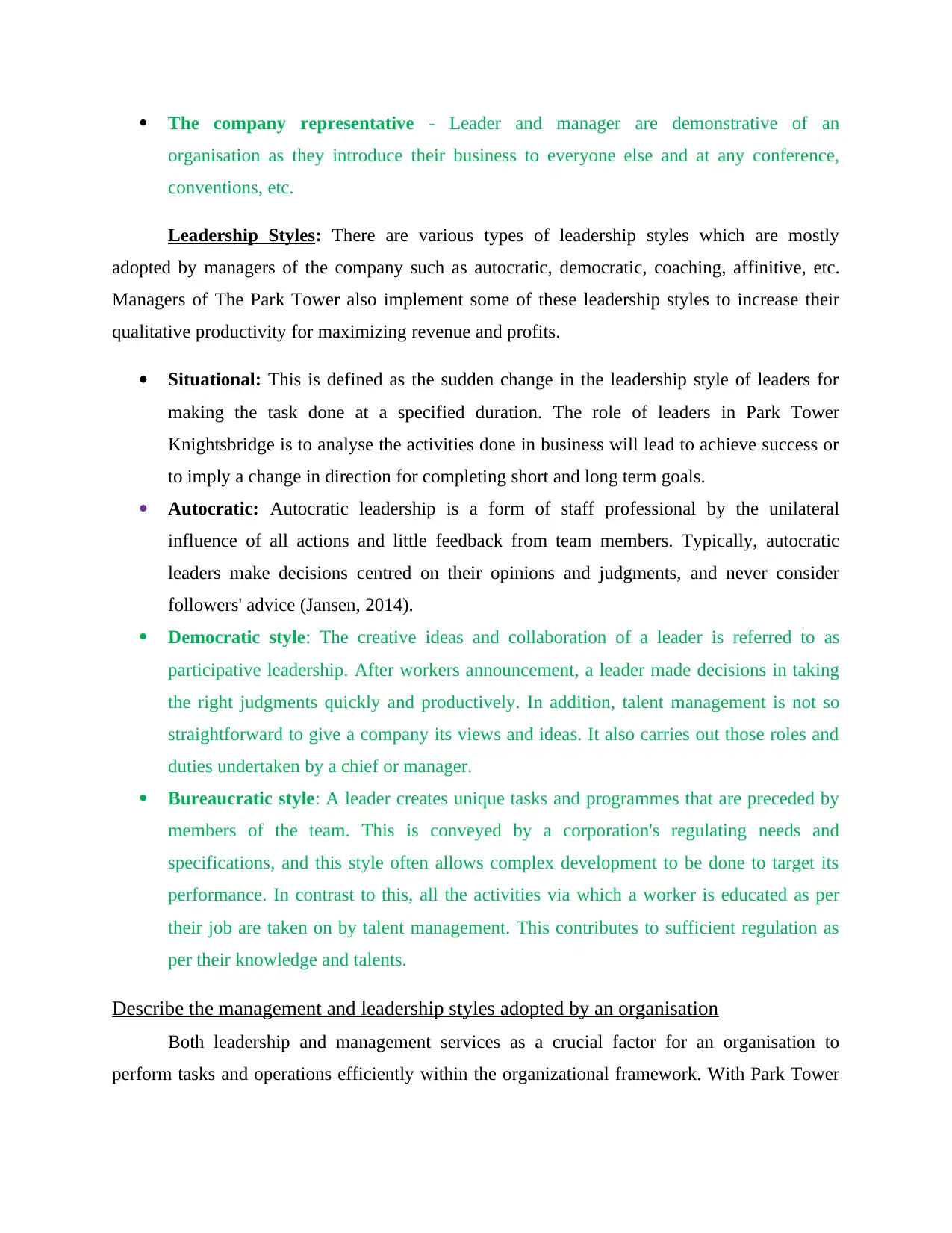
The company representative - Leader and manager are demonstrative of an
organisation as they introduce their business to everyone else and at any conference,
conventions, etc.
Leadership Styles: There are various types of leadership styles which are mostly
adopted by managers of the company such as autocratic, democratic, coaching, affinitive, etc.
Managers of The Park Tower also implement some of these leadership styles to increase their
qualitative productivity for maximizing revenue and profits.
Situational: This is defined as the sudden change in the leadership style of leaders for
making the task done at a specified duration. The role of leaders in Park Tower
Knightsbridge is to analyse the activities done in business will lead to achieve success or
to imply a change in direction for completing short and long term goals.
Autocratic: Autocratic leadership is a form of staff professional by the unilateral
influence of all actions and little feedback from team members. Typically, autocratic
leaders make decisions centred on their opinions and judgments, and never consider
followers' advice (Jansen, 2014).
Democratic style: The creative ideas and collaboration of a leader is referred to as
participative leadership. After workers announcement, a leader made decisions in taking
the right judgments quickly and productively. In addition, talent management is not so
straightforward to give a company its views and ideas. It also carries out those roles and
duties undertaken by a chief or manager.
Bureaucratic style: A leader creates unique tasks and programmes that are preceded by
members of the team. This is conveyed by a corporation's regulating needs and
specifications, and this style often allows complex development to be done to target its
performance. In contrast to this, all the activities via which a worker is educated as per
their job are taken on by talent management. This contributes to sufficient regulation as
per their knowledge and talents.
Describe the management and leadership styles adopted by an organisation
Both leadership and management services as a crucial factor for an organisation to
perform tasks and operations efficiently within the organizational framework. With Park Tower
organisation as they introduce their business to everyone else and at any conference,
conventions, etc.
Leadership Styles: There are various types of leadership styles which are mostly
adopted by managers of the company such as autocratic, democratic, coaching, affinitive, etc.
Managers of The Park Tower also implement some of these leadership styles to increase their
qualitative productivity for maximizing revenue and profits.
Situational: This is defined as the sudden change in the leadership style of leaders for
making the task done at a specified duration. The role of leaders in Park Tower
Knightsbridge is to analyse the activities done in business will lead to achieve success or
to imply a change in direction for completing short and long term goals.
Autocratic: Autocratic leadership is a form of staff professional by the unilateral
influence of all actions and little feedback from team members. Typically, autocratic
leaders make decisions centred on their opinions and judgments, and never consider
followers' advice (Jansen, 2014).
Democratic style: The creative ideas and collaboration of a leader is referred to as
participative leadership. After workers announcement, a leader made decisions in taking
the right judgments quickly and productively. In addition, talent management is not so
straightforward to give a company its views and ideas. It also carries out those roles and
duties undertaken by a chief or manager.
Bureaucratic style: A leader creates unique tasks and programmes that are preceded by
members of the team. This is conveyed by a corporation's regulating needs and
specifications, and this style often allows complex development to be done to target its
performance. In contrast to this, all the activities via which a worker is educated as per
their job are taken on by talent management. This contributes to sufficient regulation as
per their knowledge and talents.
Describe the management and leadership styles adopted by an organisation
Both leadership and management services as a crucial factor for an organisation to
perform tasks and operations efficiently within the organizational framework. With Park Tower
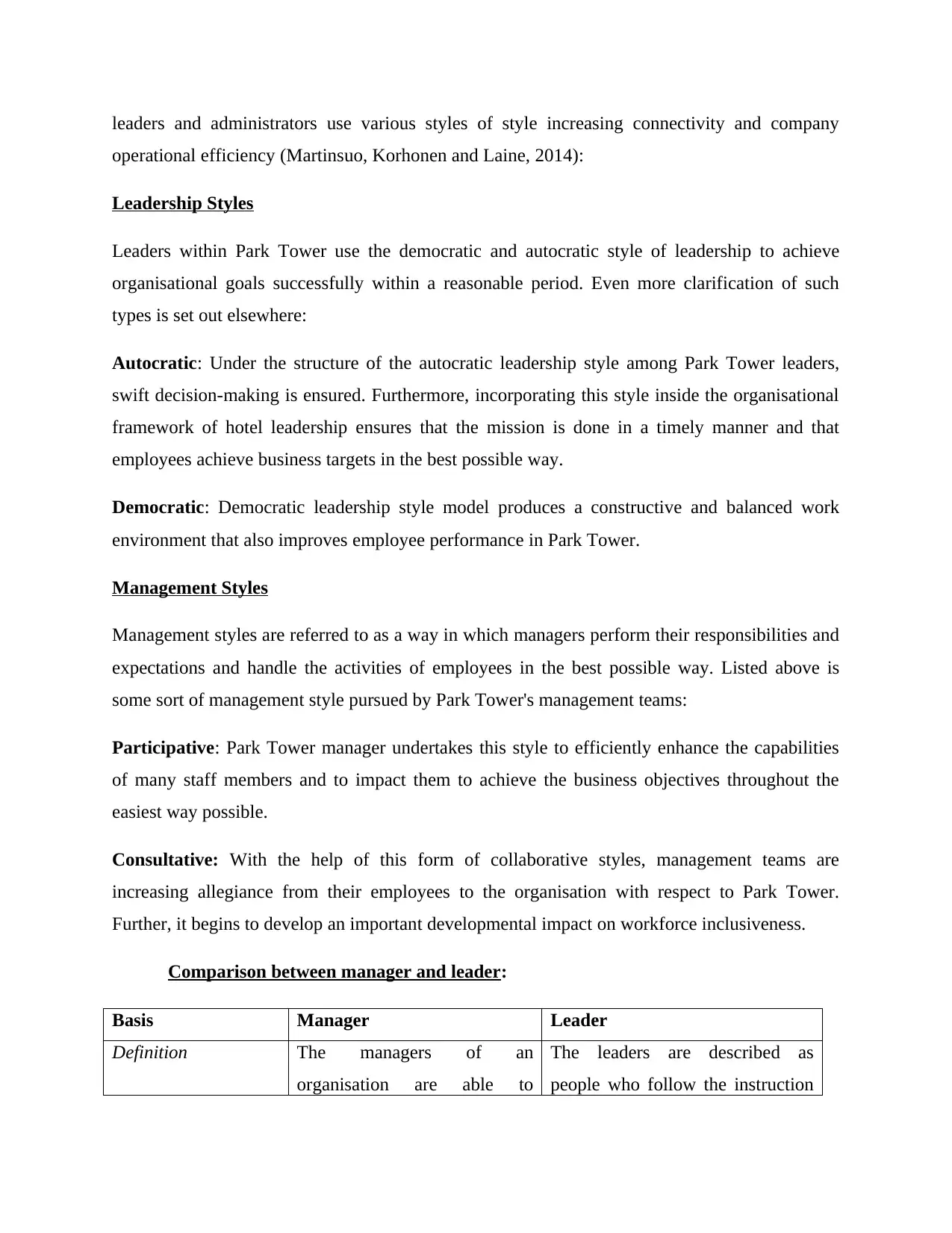
leaders and administrators use various styles of style increasing connectivity and company
operational efficiency (Martinsuo, Korhonen and Laine, 2014):
Leadership Styles
Leaders within Park Tower use the democratic and autocratic style of leadership to achieve
organisational goals successfully within a reasonable period. Even more clarification of such
types is set out elsewhere:
Autocratic: Under the structure of the autocratic leadership style among Park Tower leaders,
swift decision-making is ensured. Furthermore, incorporating this style inside the organisational
framework of hotel leadership ensures that the mission is done in a timely manner and that
employees achieve business targets in the best possible way.
Democratic: Democratic leadership style model produces a constructive and balanced work
environment that also improves employee performance in Park Tower.
Management Styles
Management styles are referred to as a way in which managers perform their responsibilities and
expectations and handle the activities of employees in the best possible way. Listed above is
some sort of management style pursued by Park Tower's management teams:
Participative: Park Tower manager undertakes this style to efficiently enhance the capabilities
of many staff members and to impact them to achieve the business objectives throughout the
easiest way possible.
Consultative: With the help of this form of collaborative styles, management teams are
increasing allegiance from their employees to the organisation with respect to Park Tower.
Further, it begins to develop an important developmental impact on workforce inclusiveness.
Comparison between manager and leader:
Basis Manager Leader
Definition The managers of an
organisation are able to
The leaders are described as
people who follow the instruction
operational efficiency (Martinsuo, Korhonen and Laine, 2014):
Leadership Styles
Leaders within Park Tower use the democratic and autocratic style of leadership to achieve
organisational goals successfully within a reasonable period. Even more clarification of such
types is set out elsewhere:
Autocratic: Under the structure of the autocratic leadership style among Park Tower leaders,
swift decision-making is ensured. Furthermore, incorporating this style inside the organisational
framework of hotel leadership ensures that the mission is done in a timely manner and that
employees achieve business targets in the best possible way.
Democratic: Democratic leadership style model produces a constructive and balanced work
environment that also improves employee performance in Park Tower.
Management Styles
Management styles are referred to as a way in which managers perform their responsibilities and
expectations and handle the activities of employees in the best possible way. Listed above is
some sort of management style pursued by Park Tower's management teams:
Participative: Park Tower manager undertakes this style to efficiently enhance the capabilities
of many staff members and to impact them to achieve the business objectives throughout the
easiest way possible.
Consultative: With the help of this form of collaborative styles, management teams are
increasing allegiance from their employees to the organisation with respect to Park Tower.
Further, it begins to develop an important developmental impact on workforce inclusiveness.
Comparison between manager and leader:
Basis Manager Leader
Definition The managers of an
organisation are able to
The leaders are described as
people who follow the instruction
⊘ This is a preview!⊘
Do you want full access?
Subscribe today to unlock all pages.

Trusted by 1+ million students worldwide
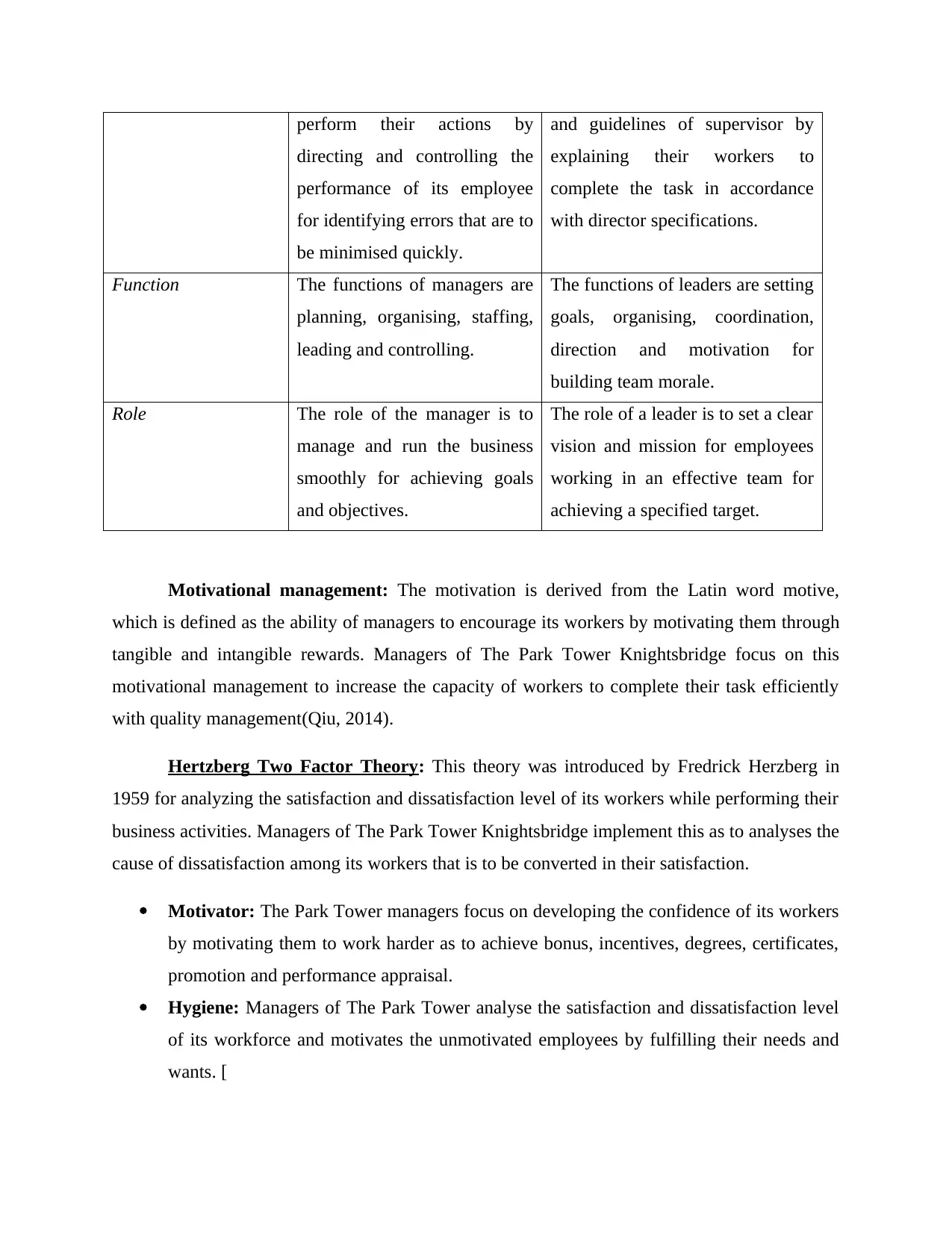
perform their actions by
directing and controlling the
performance of its employee
for identifying errors that are to
be minimised quickly.
and guidelines of supervisor by
explaining their workers to
complete the task in accordance
with director specifications.
Function The functions of managers are
planning, organising, staffing,
leading and controlling.
The functions of leaders are setting
goals, organising, coordination,
direction and motivation for
building team morale.
Role The role of the manager is to
manage and run the business
smoothly for achieving goals
and objectives.
The role of a leader is to set a clear
vision and mission for employees
working in an effective team for
achieving a specified target.
Motivational management: The motivation is derived from the Latin word motive,
which is defined as the ability of managers to encourage its workers by motivating them through
tangible and intangible rewards. Managers of The Park Tower Knightsbridge focus on this
motivational management to increase the capacity of workers to complete their task efficiently
with quality management(Qiu, 2014).
Hertzberg Two Factor Theory: This theory was introduced by Fredrick Herzberg in
1959 for analyzing the satisfaction and dissatisfaction level of its workers while performing their
business activities. Managers of The Park Tower Knightsbridge implement this as to analyses the
cause of dissatisfaction among its workers that is to be converted in their satisfaction.
Motivator: The Park Tower managers focus on developing the confidence of its workers
by motivating them to work harder as to achieve bonus, incentives, degrees, certificates,
promotion and performance appraisal.
Hygiene: Managers of The Park Tower analyse the satisfaction and dissatisfaction level
of its workforce and motivates the unmotivated employees by fulfilling their needs and
wants. [
directing and controlling the
performance of its employee
for identifying errors that are to
be minimised quickly.
and guidelines of supervisor by
explaining their workers to
complete the task in accordance
with director specifications.
Function The functions of managers are
planning, organising, staffing,
leading and controlling.
The functions of leaders are setting
goals, organising, coordination,
direction and motivation for
building team morale.
Role The role of the manager is to
manage and run the business
smoothly for achieving goals
and objectives.
The role of a leader is to set a clear
vision and mission for employees
working in an effective team for
achieving a specified target.
Motivational management: The motivation is derived from the Latin word motive,
which is defined as the ability of managers to encourage its workers by motivating them through
tangible and intangible rewards. Managers of The Park Tower Knightsbridge focus on this
motivational management to increase the capacity of workers to complete their task efficiently
with quality management(Qiu, 2014).
Hertzberg Two Factor Theory: This theory was introduced by Fredrick Herzberg in
1959 for analyzing the satisfaction and dissatisfaction level of its workers while performing their
business activities. Managers of The Park Tower Knightsbridge implement this as to analyses the
cause of dissatisfaction among its workers that is to be converted in their satisfaction.
Motivator: The Park Tower managers focus on developing the confidence of its workers
by motivating them to work harder as to achieve bonus, incentives, degrees, certificates,
promotion and performance appraisal.
Hygiene: Managers of The Park Tower analyse the satisfaction and dissatisfaction level
of its workforce and motivates the unmotivated employees by fulfilling their needs and
wants. [
Paraphrase This Document
Need a fresh take? Get an instant paraphrase of this document with our AI Paraphraser
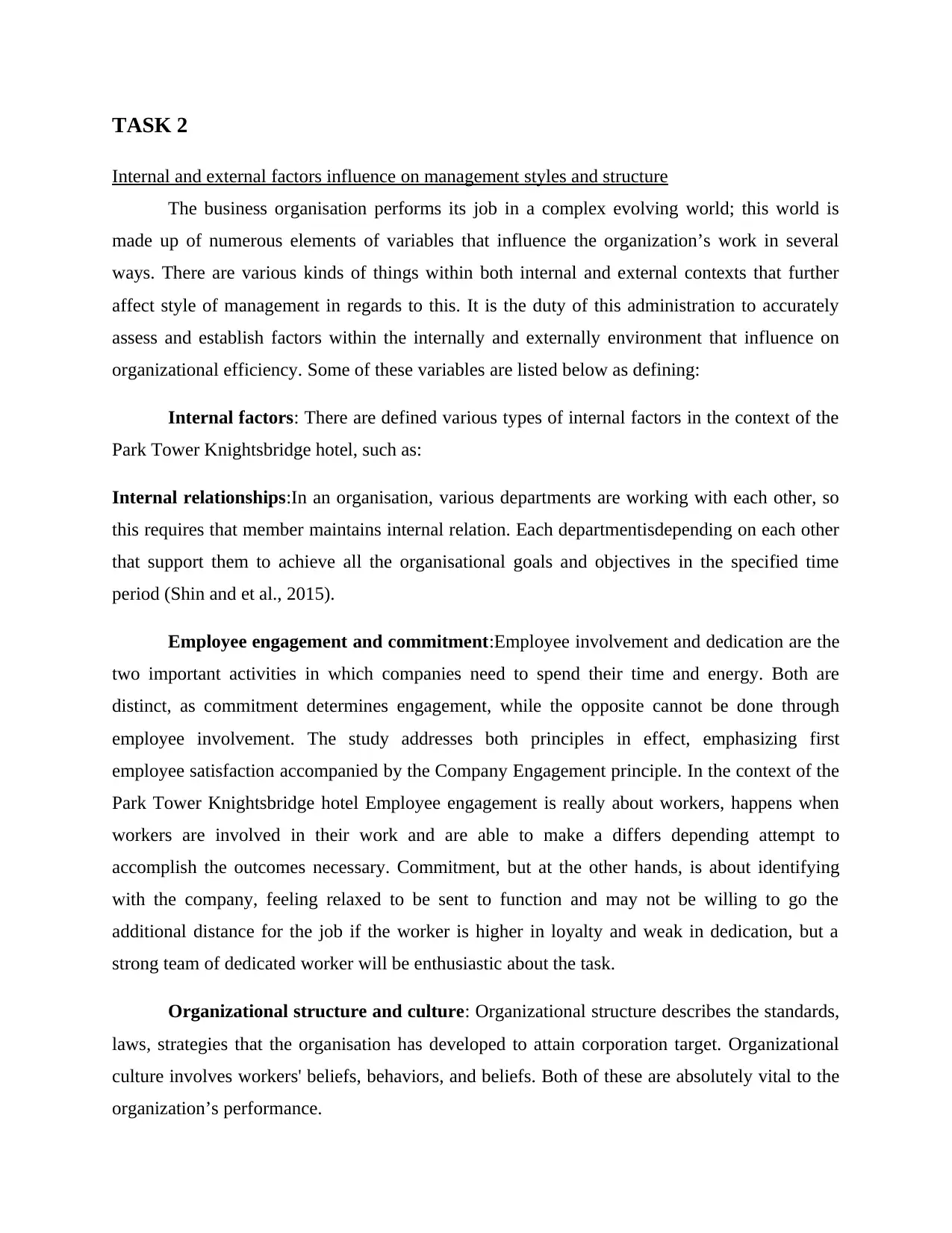
TASK 2
Internal and external factors influence on management styles and structure
The business organisation performs its job in a complex evolving world; this world is
made up of numerous elements of variables that influence the organization’s work in several
ways. There are various kinds of things within both internal and external contexts that further
affect style of management in regards to this. It is the duty of this administration to accurately
assess and establish factors within the internally and externally environment that influence on
organizational efficiency. Some of these variables are listed below as defining:
Internal factors: There are defined various types of internal factors in the context of the
Park Tower Knightsbridge hotel, such as:
Internal relationships:In an organisation, various departments are working with each other, so
this requires that member maintains internal relation. Each departmentisdepending on each other
that support them to achieve all the organisational goals and objectives in the specified time
period (Shin and et al., 2015).
Employee engagement and commitment:Employee involvement and dedication are the
two important activities in which companies need to spend their time and energy. Both are
distinct, as commitment determines engagement, while the opposite cannot be done through
employee involvement. The study addresses both principles in effect, emphasizing first
employee satisfaction accompanied by the Company Engagement principle. In the context of the
Park Tower Knightsbridge hotel Employee engagement is really about workers, happens when
workers are involved in their work and are able to make a differs depending attempt to
accomplish the outcomes necessary. Commitment, but at the other hands, is about identifying
with the company, feeling relaxed to be sent to function and may not be willing to go the
additional distance for the job if the worker is higher in loyalty and weak in dedication, but a
strong team of dedicated worker will be enthusiastic about the task.
Organizational structure and culture: Organizational structure describes the standards,
laws, strategies that the organisation has developed to attain corporation target. Organizational
culture involves workers' beliefs, behaviors, and beliefs. Both of these are absolutely vital to the
organization’s performance.
Internal and external factors influence on management styles and structure
The business organisation performs its job in a complex evolving world; this world is
made up of numerous elements of variables that influence the organization’s work in several
ways. There are various kinds of things within both internal and external contexts that further
affect style of management in regards to this. It is the duty of this administration to accurately
assess and establish factors within the internally and externally environment that influence on
organizational efficiency. Some of these variables are listed below as defining:
Internal factors: There are defined various types of internal factors in the context of the
Park Tower Knightsbridge hotel, such as:
Internal relationships:In an organisation, various departments are working with each other, so
this requires that member maintains internal relation. Each departmentisdepending on each other
that support them to achieve all the organisational goals and objectives in the specified time
period (Shin and et al., 2015).
Employee engagement and commitment:Employee involvement and dedication are the
two important activities in which companies need to spend their time and energy. Both are
distinct, as commitment determines engagement, while the opposite cannot be done through
employee involvement. The study addresses both principles in effect, emphasizing first
employee satisfaction accompanied by the Company Engagement principle. In the context of the
Park Tower Knightsbridge hotel Employee engagement is really about workers, happens when
workers are involved in their work and are able to make a differs depending attempt to
accomplish the outcomes necessary. Commitment, but at the other hands, is about identifying
with the company, feeling relaxed to be sent to function and may not be willing to go the
additional distance for the job if the worker is higher in loyalty and weak in dedication, but a
strong team of dedicated worker will be enthusiastic about the task.
Organizational structure and culture: Organizational structure describes the standards,
laws, strategies that the organisation has developed to attain corporation target. Organizational
culture involves workers' beliefs, behaviors, and beliefs. Both of these are absolutely vital to the
organization’s performance.
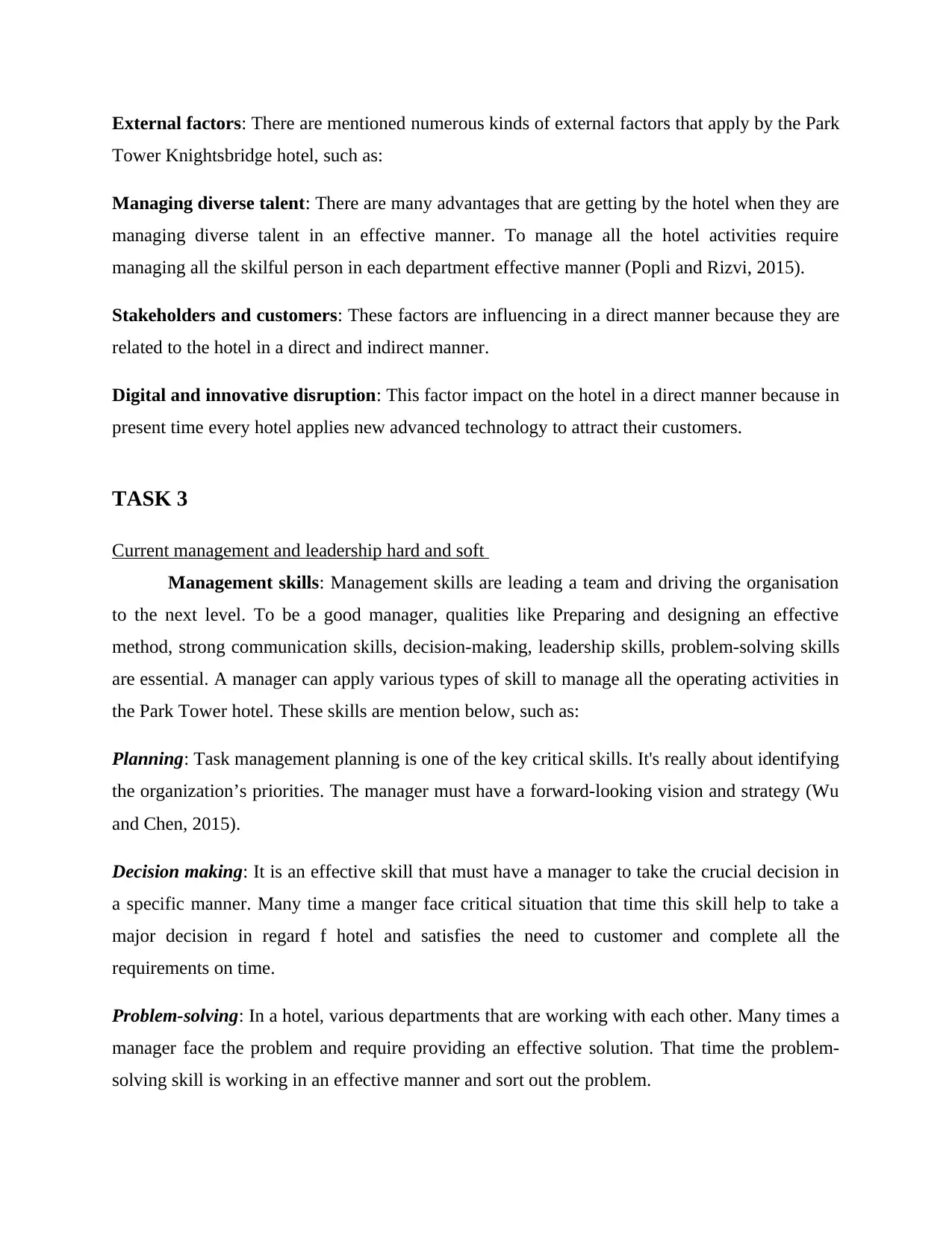
External factors: There are mentioned numerous kinds of external factors that apply by the Park
Tower Knightsbridge hotel, such as:
Managing diverse talent: There are many advantages that are getting by the hotel when they are
managing diverse talent in an effective manner. To manage all the hotel activities require
managing all the skilful person in each department effective manner (Popli and Rizvi, 2015).
Stakeholders and customers: These factors are influencing in a direct manner because they are
related to the hotel in a direct and indirect manner.
Digital and innovative disruption: This factor impact on the hotel in a direct manner because in
present time every hotel applies new advanced technology to attract their customers.
TASK 3
Current management and leadership hard and soft
Management skills: Management skills are leading a team and driving the organisation
to the next level. To be a good manager, qualities like Preparing and designing an effective
method, strong communication skills, decision-making, leadership skills, problem-solving skills
are essential. A manager can apply various types of skill to manage all the operating activities in
the Park Tower hotel. These skills are mention below, such as:
Planning: Task management planning is one of the key critical skills. It's really about identifying
the organization’s priorities. The manager must have a forward-looking vision and strategy (Wu
and Chen, 2015).
Decision making: It is an effective skill that must have a manager to take the crucial decision in
a specific manner. Many time a manger face critical situation that time this skill help to take a
major decision in regard f hotel and satisfies the need to customer and complete all the
requirements on time.
Problem-solving: In a hotel, various departments that are working with each other. Many times a
manager face the problem and require providing an effective solution. That time the problem-
solving skill is working in an effective manner and sort out the problem.
Tower Knightsbridge hotel, such as:
Managing diverse talent: There are many advantages that are getting by the hotel when they are
managing diverse talent in an effective manner. To manage all the hotel activities require
managing all the skilful person in each department effective manner (Popli and Rizvi, 2015).
Stakeholders and customers: These factors are influencing in a direct manner because they are
related to the hotel in a direct and indirect manner.
Digital and innovative disruption: This factor impact on the hotel in a direct manner because in
present time every hotel applies new advanced technology to attract their customers.
TASK 3
Current management and leadership hard and soft
Management skills: Management skills are leading a team and driving the organisation
to the next level. To be a good manager, qualities like Preparing and designing an effective
method, strong communication skills, decision-making, leadership skills, problem-solving skills
are essential. A manager can apply various types of skill to manage all the operating activities in
the Park Tower hotel. These skills are mention below, such as:
Planning: Task management planning is one of the key critical skills. It's really about identifying
the organization’s priorities. The manager must have a forward-looking vision and strategy (Wu
and Chen, 2015).
Decision making: It is an effective skill that must have a manager to take the crucial decision in
a specific manner. Many time a manger face critical situation that time this skill help to take a
major decision in regard f hotel and satisfies the need to customer and complete all the
requirements on time.
Problem-solving: In a hotel, various departments that are working with each other. Many times a
manager face the problem and require providing an effective solution. That time the problem-
solving skill is working in an effective manner and sort out the problem.
⊘ This is a preview!⊘
Do you want full access?
Subscribe today to unlock all pages.

Trusted by 1+ million students worldwide
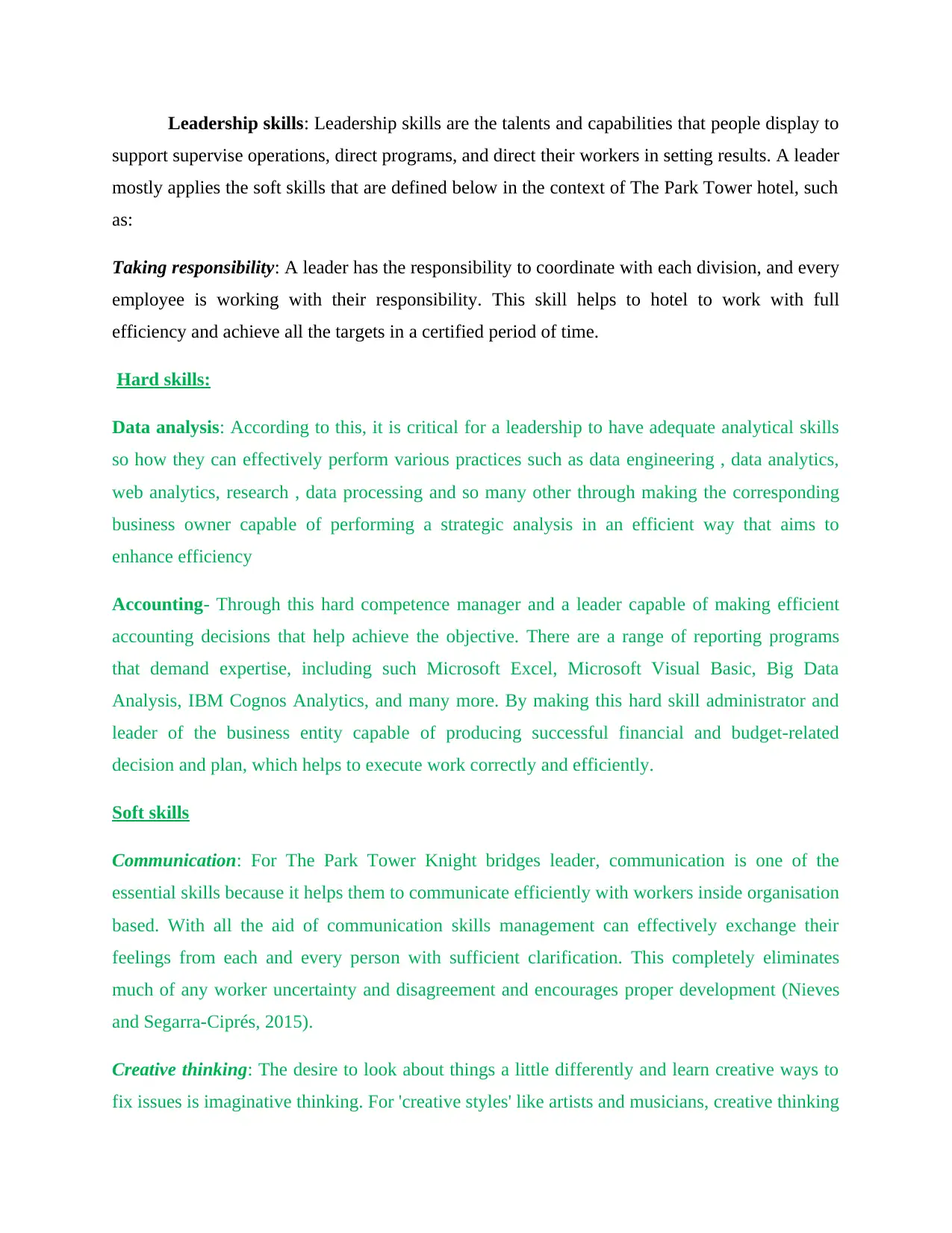
Leadership skills: Leadership skills are the talents and capabilities that people display to
support supervise operations, direct programs, and direct their workers in setting results. A leader
mostly applies the soft skills that are defined below in the context of The Park Tower hotel, such
as:
Taking responsibility: A leader has the responsibility to coordinate with each division, and every
employee is working with their responsibility. This skill helps to hotel to work with full
efficiency and achieve all the targets in a certified period of time.
Hard skills:
Data analysis: According to this, it is critical for a leadership to have adequate analytical skills
so how they can effectively perform various practices such as data engineering , data analytics,
web analytics, research , data processing and so many other through making the corresponding
business owner capable of performing a strategic analysis in an efficient way that aims to
enhance efficiency
Accounting- Through this hard competence manager and a leader capable of making efficient
accounting decisions that help achieve the objective. There are a range of reporting programs
that demand expertise, including such Microsoft Excel, Microsoft Visual Basic, Big Data
Analysis, IBM Cognos Analytics, and many more. By making this hard skill administrator and
leader of the business entity capable of producing successful financial and budget-related
decision and plan, which helps to execute work correctly and efficiently.
Soft skills
Communication: For The Park Tower Knight bridges leader, communication is one of the
essential skills because it helps them to communicate efficiently with workers inside organisation
based. With all the aid of communication skills management can effectively exchange their
feelings from each and every person with sufficient clarification. This completely eliminates
much of any worker uncertainty and disagreement and encourages proper development (Nieves
and Segarra-Ciprés, 2015).
Creative thinking: The desire to look about things a little differently and learn creative ways to
fix issues is imaginative thinking. For 'creative styles' like artists and musicians, creative thinking
support supervise operations, direct programs, and direct their workers in setting results. A leader
mostly applies the soft skills that are defined below in the context of The Park Tower hotel, such
as:
Taking responsibility: A leader has the responsibility to coordinate with each division, and every
employee is working with their responsibility. This skill helps to hotel to work with full
efficiency and achieve all the targets in a certified period of time.
Hard skills:
Data analysis: According to this, it is critical for a leadership to have adequate analytical skills
so how they can effectively perform various practices such as data engineering , data analytics,
web analytics, research , data processing and so many other through making the corresponding
business owner capable of performing a strategic analysis in an efficient way that aims to
enhance efficiency
Accounting- Through this hard competence manager and a leader capable of making efficient
accounting decisions that help achieve the objective. There are a range of reporting programs
that demand expertise, including such Microsoft Excel, Microsoft Visual Basic, Big Data
Analysis, IBM Cognos Analytics, and many more. By making this hard skill administrator and
leader of the business entity capable of producing successful financial and budget-related
decision and plan, which helps to execute work correctly and efficiently.
Soft skills
Communication: For The Park Tower Knight bridges leader, communication is one of the
essential skills because it helps them to communicate efficiently with workers inside organisation
based. With all the aid of communication skills management can effectively exchange their
feelings from each and every person with sufficient clarification. This completely eliminates
much of any worker uncertainty and disagreement and encourages proper development (Nieves
and Segarra-Ciprés, 2015).
Creative thinking: The desire to look about things a little differently and learn creative ways to
fix issues is imaginative thinking. For 'creative styles' like artists and musicians, creative thinking
Paraphrase This Document
Need a fresh take? Get an instant paraphrase of this document with our AI Paraphraser
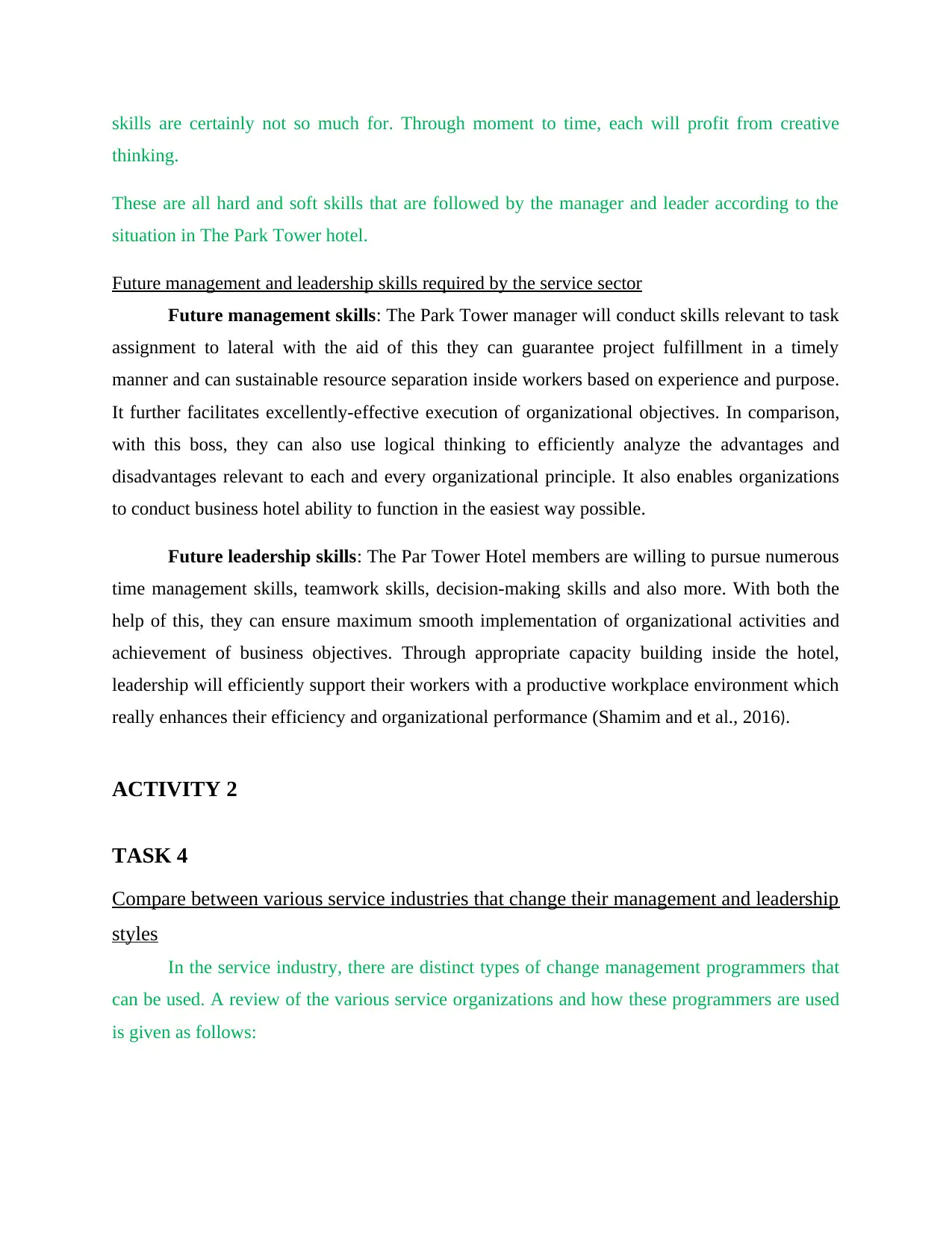
skills are certainly not so much for. Through moment to time, each will profit from creative
thinking.
These are all hard and soft skills that are followed by the manager and leader according to the
situation in The Park Tower hotel.
Future management and leadership skills required by the service sector
Future management skills: The Park Tower manager will conduct skills relevant to task
assignment to lateral with the aid of this they can guarantee project fulfillment in a timely
manner and can sustainable resource separation inside workers based on experience and purpose.
It further facilitates excellently-effective execution of organizational objectives. In comparison,
with this boss, they can also use logical thinking to efficiently analyze the advantages and
disadvantages relevant to each and every organizational principle. It also enables organizations
to conduct business hotel ability to function in the easiest way possible.
Future leadership skills: The Par Tower Hotel members are willing to pursue numerous
time management skills, teamwork skills, decision-making skills and also more. With both the
help of this, they can ensure maximum smooth implementation of organizational activities and
achievement of business objectives. Through appropriate capacity building inside the hotel,
leadership will efficiently support their workers with a productive workplace environment which
really enhances their efficiency and organizational performance (Shamim and et al., 2016).
ACTIVITY 2
TASK 4
Compare between various service industries that change their management and leadership
styles
In the service industry, there are distinct types of change management programmers that
can be used. A review of the various service organizations and how these programmers are used
is given as follows:
thinking.
These are all hard and soft skills that are followed by the manager and leader according to the
situation in The Park Tower hotel.
Future management and leadership skills required by the service sector
Future management skills: The Park Tower manager will conduct skills relevant to task
assignment to lateral with the aid of this they can guarantee project fulfillment in a timely
manner and can sustainable resource separation inside workers based on experience and purpose.
It further facilitates excellently-effective execution of organizational objectives. In comparison,
with this boss, they can also use logical thinking to efficiently analyze the advantages and
disadvantages relevant to each and every organizational principle. It also enables organizations
to conduct business hotel ability to function in the easiest way possible.
Future leadership skills: The Par Tower Hotel members are willing to pursue numerous
time management skills, teamwork skills, decision-making skills and also more. With both the
help of this, they can ensure maximum smooth implementation of organizational activities and
achievement of business objectives. Through appropriate capacity building inside the hotel,
leadership will efficiently support their workers with a productive workplace environment which
really enhances their efficiency and organizational performance (Shamim and et al., 2016).
ACTIVITY 2
TASK 4
Compare between various service industries that change their management and leadership
styles
In the service industry, there are distinct types of change management programmers that
can be used. A review of the various service organizations and how these programmers are used
is given as follows:
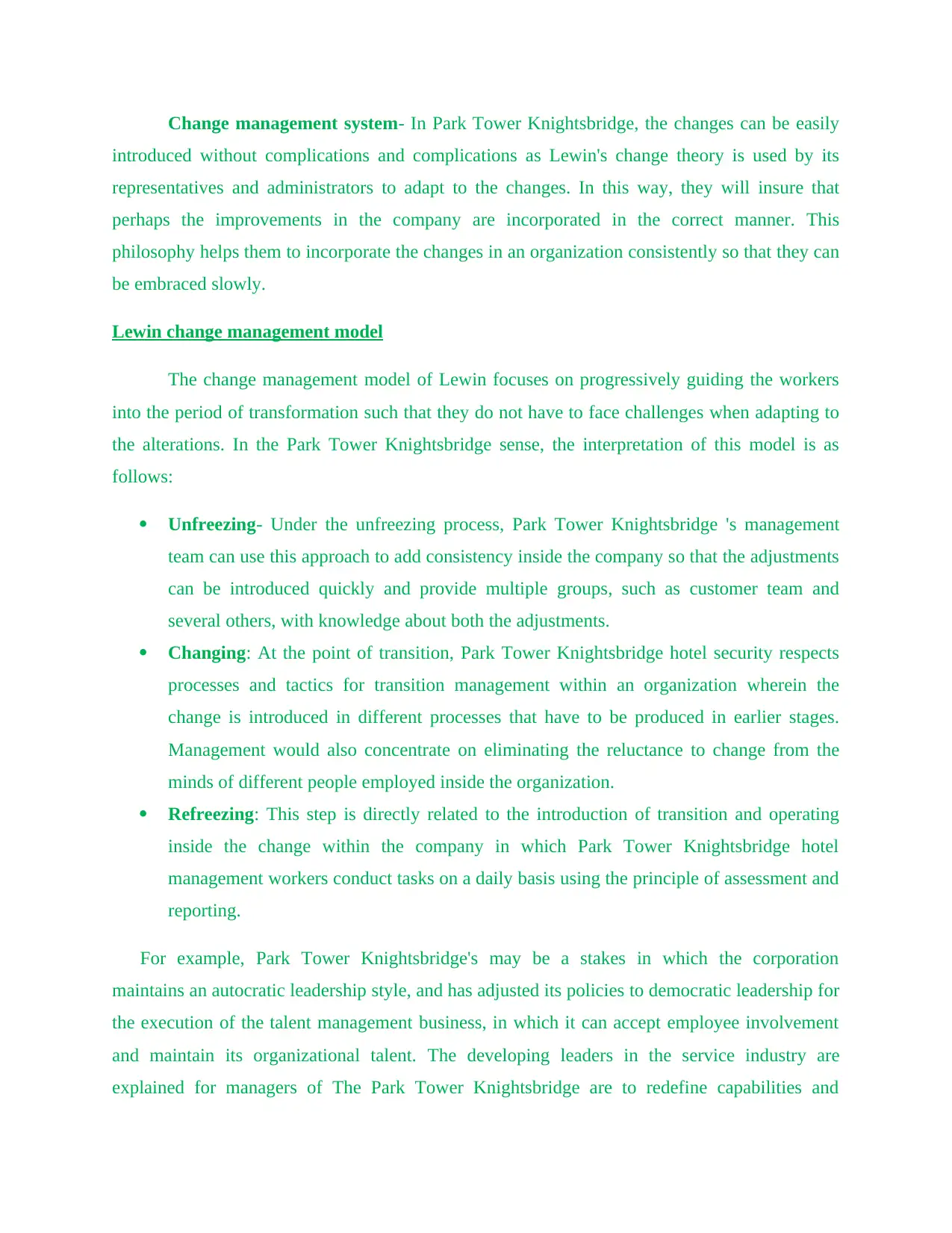
Change management system- In Park Tower Knightsbridge, the changes can be easily
introduced without complications and complications as Lewin's change theory is used by its
representatives and administrators to adapt to the changes. In this way, they will insure that
perhaps the improvements in the company are incorporated in the correct manner. This
philosophy helps them to incorporate the changes in an organization consistently so that they can
be embraced slowly.
Lewin change management model
The change management model of Lewin focuses on progressively guiding the workers
into the period of transformation such that they do not have to face challenges when adapting to
the alterations. In the Park Tower Knightsbridge sense, the interpretation of this model is as
follows:
Unfreezing- Under the unfreezing process, Park Tower Knightsbridge 's management
team can use this approach to add consistency inside the company so that the adjustments
can be introduced quickly and provide multiple groups, such as customer team and
several others, with knowledge about both the adjustments.
Changing: At the point of transition, Park Tower Knightsbridge hotel security respects
processes and tactics for transition management within an organization wherein the
change is introduced in different processes that have to be produced in earlier stages.
Management would also concentrate on eliminating the reluctance to change from the
minds of different people employed inside the organization.
Refreezing: This step is directly related to the introduction of transition and operating
inside the change within the company in which Park Tower Knightsbridge hotel
management workers conduct tasks on a daily basis using the principle of assessment and
reporting.
For example, Park Tower Knightsbridge's may be a stakes in which the corporation
maintains an autocratic leadership style, and has adjusted its policies to democratic leadership for
the execution of the talent management business, in which it can accept employee involvement
and maintain its organizational talent. The developing leaders in the service industry are
explained for managers of The Park Tower Knightsbridge are to redefine capabilities and
introduced without complications and complications as Lewin's change theory is used by its
representatives and administrators to adapt to the changes. In this way, they will insure that
perhaps the improvements in the company are incorporated in the correct manner. This
philosophy helps them to incorporate the changes in an organization consistently so that they can
be embraced slowly.
Lewin change management model
The change management model of Lewin focuses on progressively guiding the workers
into the period of transformation such that they do not have to face challenges when adapting to
the alterations. In the Park Tower Knightsbridge sense, the interpretation of this model is as
follows:
Unfreezing- Under the unfreezing process, Park Tower Knightsbridge 's management
team can use this approach to add consistency inside the company so that the adjustments
can be introduced quickly and provide multiple groups, such as customer team and
several others, with knowledge about both the adjustments.
Changing: At the point of transition, Park Tower Knightsbridge hotel security respects
processes and tactics for transition management within an organization wherein the
change is introduced in different processes that have to be produced in earlier stages.
Management would also concentrate on eliminating the reluctance to change from the
minds of different people employed inside the organization.
Refreezing: This step is directly related to the introduction of transition and operating
inside the change within the company in which Park Tower Knightsbridge hotel
management workers conduct tasks on a daily basis using the principle of assessment and
reporting.
For example, Park Tower Knightsbridge's may be a stakes in which the corporation
maintains an autocratic leadership style, and has adjusted its policies to democratic leadership for
the execution of the talent management business, in which it can accept employee involvement
and maintain its organizational talent. The developing leaders in the service industry are
explained for managers of The Park Tower Knightsbridge are to redefine capabilities and
⊘ This is a preview!⊘
Do you want full access?
Subscribe today to unlock all pages.

Trusted by 1+ million students worldwide
1 out of 15
Related Documents
Your All-in-One AI-Powered Toolkit for Academic Success.
+13062052269
info@desklib.com
Available 24*7 on WhatsApp / Email
![[object Object]](/_next/static/media/star-bottom.7253800d.svg)
Unlock your academic potential
Copyright © 2020–2026 A2Z Services. All Rights Reserved. Developed and managed by ZUCOL.




